formerly eScholarship Editions


|
|
|
|
Your request for similar items found 20 book(s). | Modify Search | Displaying 1 - 20 of 20 book(s) | |
| 1. | 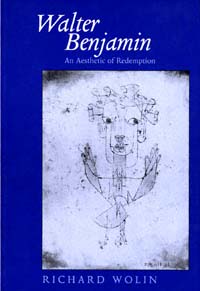 | Title: Walter Benjamin, an aesthetic of redemption Author: Wolin, Richard Published: University of California Press, 1994 Subjects: Philosophy | Literary Theory and Criticism Publisher's Description: Few twentieth-century thinkers have proven as influential as Walter Benjamin, the German-Jewish philosopher and cultural and literary critic. Richard Wolin's book remains among the clearest and most insightful introductions to Benjamin's writings, offering a philosophically rich exposition of his complex relationship to Adorno, Brecht, Jewish Messianism, and Western Marxism. Wolin provides nuanced interpretations of Benjamin's widely studied writings on Baudelaire, historiography, and art in the age of mechanical reproduction. In a new Introduction written especially for this edition, Wolin discusses the unfinished Arcades Project , as well as recent tendencies in the reception of Benjamin's work and the relevance of his ideas to contemporary debates about modernity and postmodernity. [brief] Similar Items |
| 2. | 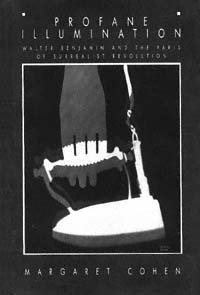 | Title: Profane illumination: Walter Benjamin and the Paris of surrealist revolution Author: Cohen, Margaret Published: University of California Press, 1993 Subjects: German Studies | Philosophy | Literary Theory and Criticism Publisher's Description: Margaret Cohen's encounter with Walter Benjamin, one of the twentieth century's most influential cultural and literary critics, has produced a radically new reading of surrealist thought and practice. Cohen analyzes the links between Breton's surrealist fusion of psychoanalysis and Marxism and Benjamin's post-Enlightenment challenge to Marxist theory. She argues that Breton's surrealist Marxism played a formative role in shaping postwar French intellectual life and is of continued relevance to the contemporary intellectual scene. [brief] Similar Items |
| 3. | 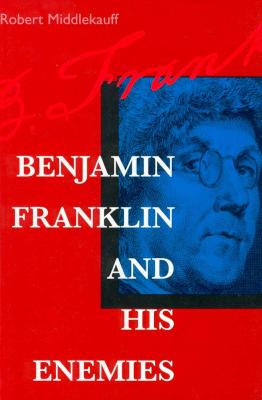 | Title: Benjamin Franklin and his enemies Author: Middlekauff, Robert Published: University of California Press, 1996 Subjects: History | United States History | Autobiographies and Biographies | American Studies Publisher's Description: In this engaging study of the much-loved statesman and polymath, Robert Middlekauff uncovers a little-known aspect of Benjamin Franklin's personality - his passionate anger. He reveals a fully human Franklin who led a remarkable life but nonetheless had his share of hostile relationships - political adversaries like the Penns, John Adams, and Arthur Lee - and great disappointments - the most significant being his son, William, who sided with the British. Utilizing an abundance of archival sources, Middlekauff weaves episodes in Franklin's emotional life into key moments in colonial and Revolutionary history. The result is a highly readable narrative that illuminates how historical passions can torment even the most rational and benevolent of men. [brief] Similar Items |
| 4. | 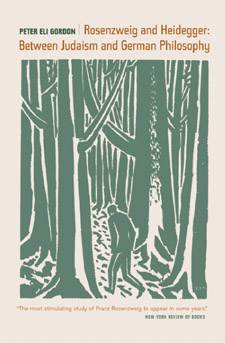 | Title: Rosenzweig and Heidegger: between Judaism and German philosophy Author: Gordon, Peter Eli Published: University of California Press, 2003 Subjects: History | German Studies | Religion | Judaism | European History | Intellectual History | Jewish Studies | Social and Political Thought Publisher's Description: Franz Rosenzweig (1886-1929) is widely regarded today as one of the most original and intellectually challenging figures within the so-called renaissance of German-Jewish thought in the Weimar period. The architect of a unique kind of existential theology, and an important influence upon such philosophers as Walter Benjamin, Martin Buber, Leo Strauss, and Emmanuel Levinas, Rosenzweig is remembered chiefly as a "Jewish thinker," often to the neglect of his broader philosophical concerns. Cutting across the artificial divide that the traumatic memory of National Socialism has drawn between German and Jewish philosophy, this book seeks to restore Rosenzweig's thought to the German philosophical horizon in which it first took shape. It is the first English-language study to explore Rosenzweig's enduring debt to Hegel's political theory, neo-Kantianism, and life-philosophy; the book also provides a new, systematic reading of Rosenzweig's major work, The Star of Redemption. Most of all, the book sets out to explore a surprising but deep affinity between Rosenzweig's thought and that of his contemporary, the German philosopher Martin Heidegger. Resisting both apologetics and condemnation, Gordon suggests that Heidegger's engagement with Nazism should not obscure the profound and intellectually compelling bond in the once-shared tradition of modern German and Jewish thought. A remarkably lucid discussion of two notably difficult thinkers, this book represents an eloquent attempt to bridge the forced distinction between modern Jewish thought and the history of modern German philosophy - and to show that such a distinction cannot be sustained without doing violence to both. [brief] Similar Items |
| 5. | 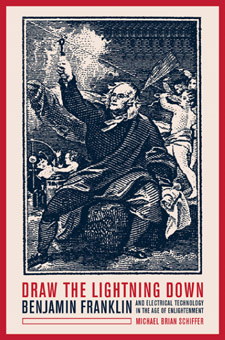 | Title: Draw the lightning down: Benjamin Franklin and electrical technology in the Age of Enlightenment Author: Schiffer, Michael B Published: University of California Press, 2003 Subjects: History | Urban Studies | History of Science | Anthropology | American Studies | European History Publisher's Description: Most of us know - at least we've heard - that Benjamin Franklin conducted some kind of electrical experiment with a kite. What few of us realize - and what this book makes powerfully clear - is that Franklin played a major role in laying the foundations of modern electrical science and technology. This fast-paced book, rich with historical details and anecdotes, brings to life Franklin, the large international network of scientists and inventors in which he played a key role, and their amazing inventions. We learn what these early electrical devices - from lights and motors to musical and medical instruments - looked like, how they worked, and what their utilitarian and symbolic meanings were for those who invented and used them. Against the fascinating panorama of life in the eighteenth century, Michael Brian Schiffer tells the story of the very beginnings of our modern electrical world. The earliest electrical technologies were conceived in the laboratory apparatus of physicists; because of their surprising and diverse effects, however, these technologies rapidly made their way into many other communities and activities. Schiffer conducts us from community to community, showing how these technologies worked as they were put to use in public lectures, revolutionary experiments in chemistry and biology, and medical therapy. This story brings to light the arcane and long-forgotten inventions that made way for many modern technologies - including lightning rods (Franklin's invention), cardiac stimulation, xerography, and the internal combustion engine - and richly conveys the complex relationships among science, technology, and culture. [brief] Similar Items |
| 6. | 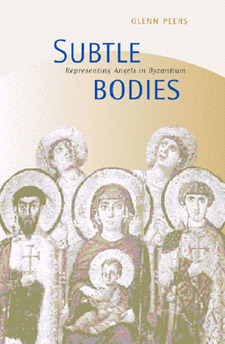 | Title: Subtle bodies: representing angels in Byzantium Author: Peers, Glenn Published: University of California Press, 2001 Subjects: Art | Medieval Studies | Art History | Christianity | Art and Architecture Publisher's Description: Throughout the course of Byzantine history, Christian doctrine taught that angels have a powerful place in cosmology. It also taught that angels were immaterial, bodiless, invisible beings. But if that were the case, how could they be visualized and depicted in icons and other works of art? This book describes the strategies used by Byzantine artists to represent the incorporeal forms of angels and the rationalizations in defense of their representations mustered by theologians in the face of iconoclastic opposition. Glenn Peers demonstrates that these problems of representation provide a unique window on Late Antique thought in general. [brief] Similar Items |
| 7. | 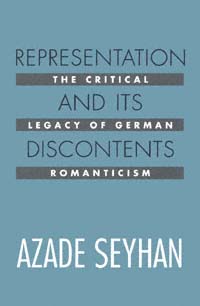 | Title: Representation and its discontents: the critical legacy of German romanticism Author: Seyhan, Azade Published: University of California Press, 1992 Subjects: Philosophy | Literary Theory and Criticism | German Studies Publisher's Description: Azade Seyhan provides a concise, elegantly argued introduction to the critical theory of German Romanticism and demonstrates how its approach to the metaphorical and linguistic nature of knowledge is very much alive in contemporary philosophy and literary theory. Her analysis of key thinkers such as Friedrich Schlegel and Novalis explores their views on rhetoric, systematicity, hermeneutics, and cultural interpretation. Seyhan examines German Romanticism as a critical intervention in the debates on representation, which developed in response to the philosophical revolution of German Idealism.Facing a chaotic political and intellectual landscape, the eighteenth-century theorists sought new models of understanding and new objectives for criticism and philosophy. Representation and Its Discontents identifies the legacy of this formative moment in modern criticism and suggests its relevance to contemporary discussions of post-structuralism, orientalism, theories of textuality, and the nature of philosophical discourse. [brief] Similar Items |
| 8. | 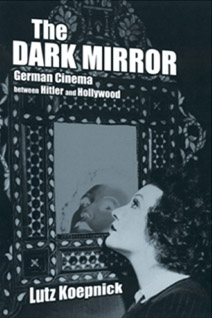 | Title: The dark mirror: German cinema between Hitler and Hollywood Author: Koepnick, Lutz P. (Lutz Peter) Published: University of California Press, 2002 Subjects: Cinema and Performance Arts | German Studies | Music | Film Publisher's Description: Lutz Koepnick analyzes the complicated relationship between two cinemas - Hollywood's and Nazi Germany's - in this theoretically and politically incisive study. The Dark Mirror examines the split course of German popular film from the early 1930s until the mid 1950s, showing how Nazi filmmakers appropriated Hollywood conventions and how German film exiles reworked German cultural material in their efforts to find a working base in the Hollywood studio system. Through detailed readings of specific films, Koepnick provides a vivid sense of the give and take between German and American cinema. [brief] Similar Items |
| 9. | 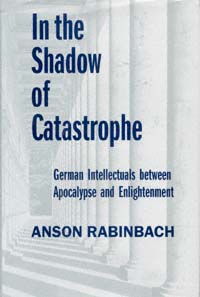 | Title: In the shadow of catastrophe: German intellectuals between apocalypse and enlightenment Author: Rabinbach, Anson Published: University of California Press, 1997 Subjects: History | German Studies | Social and Political Thought | Philosophy Publisher's Description: These essays by eminent European intellectual and cultural historian Anson Rabinbach address the writings of key figures in twentieth-century German philosophy. Rabinbach explores their ideas in relation to the two world wars and the horrors facing Europe at that time.Analyzing the work of Benjamin and Bloch, he suggests their indebtedness to the traditions of Jewish messianism. In a discussion of Hugo Ball's little-known Critique of the German Intelligentsia , Rabinbach reveals the curious intellectual career of the Dadaist and antiwar activist turned-nationalist and anti-Semite. His examination of Heidegger's "Letter on Humanism" and Jaspers's The Question of German Guilt illuminates the complex and often obscure political referents of these texts. Turning to Horkheimer and Adorno's Dialectic of Enlightenment , Rabinbach offers an arresting new interpretation of this central text of the critical theory of the Frankfurt School. Subtly and persuasively argued, his book will become an indispensable reference point for all concerned with twentieth-century German history and thought. [brief] Similar Items |
| 10. | 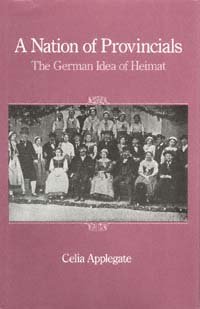 | Title: A nation of provincials: the German idea of Heimat Author: Applegate, Celia Published: University of California Press, 1990 Subjects: History | European History | German Studies Publisher's Description: At the center of this pioneering work in modern European history is the German word Heimat - the homeland, the local place. Translations barely penetrate the meaning of the word, which has provided the emotional and ideological common ground for a variety of associations and individuals devoted to the cause of local preservation. Celia Applegate examines at both the national and regional levels the cultural meaning of Heimat and why it may be pivotal to the troubled and very timely question of German identity.The ideas and activities clustered around Heimat shed new light particularly on problems of modernization. Instead of viewing the Germans as a dangerously anti-modern people, Applegate argues that they used the cultivation of Heimat to ground an abstract nationalism in their attachment to familiar places and to reconcile the modern industrial and urban world with the rural landscapes and customs they admired. Primarily a characteristic of the middle classes, love of Heimat constituted an alternative vision of German unity to the familiar aggressive, militaristic one. The Heimat vision of Germany emphasized cultural diversity and defined German identity by its internal members rather than its external enemies.Applegate asks that we re-examine the continuities of German history from the perspective of the local places that made up Germany, rather than from that of prominent intellectuals or national policymakers. The local patriotism of Heimat activists emerges as an element of German culture that persisted across the great divides of 1918, 1933, and 1945. She also suggests that this attachment to a particular place is a feature of Europeans in general and is deserving of further attention. [brief] Similar Items |
| 11. |  | Title: Historical destiny and national socialism in Heidegger's "Being and time" Author: Fritsche, Johannes Published: University of California Press, 1999 Subjects: Philosophy | German Studies | Intellectual History Publisher's Description: There has been much debate over the relationship of Heidegger's philosophy - in particular his book Being and Time - to his practical involvement with National Socialism. Yet the question has never been addressed through a comparison of Being and Time with other texts on history and politics written at the time. Johannes Fritsche does this, providing a detailed interpretation of the relevant passages in Being and Time - especially sections 72-77 on fate, community, and society. He analyzes for comparison two other authors who explicitly regarded themselves as rightists - Adolf Hitler ( Mein Kampf ) and Max Scheler ( Formalism in Ethics and other writings) - and two authors on the left - Georg Lukács ( History and Class Consciousness ) and Paul Tillich ( The Socialist Decision ).Fritsche concludes that Being and Time is a brilliant summary of right-wing politics in general, which proposes the destruction of liberal society in order to regenerate an idealized community. In addition, Heidegger rejects positions on the right, such as Scheler's, that enabled their authors to distance themselves from the most extreme political rightists, and thus he paves the way for National Socialism. Being and Time , Fritsche demonstrates, must be seen as a clear case for the National Socialists and their project of revitalization of the Volksgemeinschaft , the community of the people. [brief] Similar Items |
| 12. | 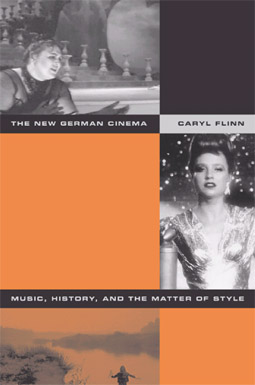 | Title: The new German cinema: music, history, and the matter of style Author: Flinn, Caryl Published: University of California Press, 2003 Subjects: Cinema and Performance Arts | German Studies | Music Publisher's Description: When New German cinema directors like R. W. Fassbinder, Ulrike Ottinger, and Werner Schroeter explored issues of identity - national, political, personal, and sexual - music and film style played crucial roles. Most studies of the celebrated film movement, however, have sidestepped the role of music, a curious oversight given its importance to German culture and nation formation. Caryl Flinn's study reverses this trend, identifying styles of historical remembrance in which music participates. Flinn concentrates on those styles that urge listeners to interact with difference - including that embodied in Germany's difficult history - rather than to "master" or "get past" it. Flinn breaks new ground by considering contemporary reception frameworks of the New German Cinema, a generation after its end. She discusses transnational, cultural, and historical contexts as well as the sexual, ethnic, national, and historical diversity of audiences. Through detailed case studies, she shows how music helps filmgoers engage with a range of historical subjects and experiences. Each chapter of The New German Cinema examines a particular stylistic strategy, assessing music's role in each. The study also examines queer strategies like kitsch and camp and explores the movement's charged construction of human bodies on which issues of ruination, survival, memory, and pleasure are played out. [brief] Similar Items |
| 13. | 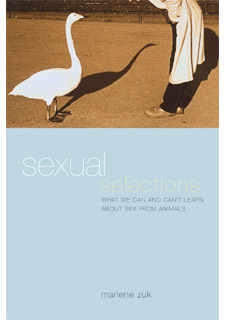 | Title: Sexual selections: what we can and can't learn about sex from animals Author: Zuk, M. (Marlene) Published: University of California Press, 2002 Subjects: Organismal Biology | Cultural Anthropology | Evolution | Gender Studies | Animal Behavior | Sociology | Biology Publisher's Description: Scientific discoveries about the animal kingdom fuel ideological battles on many fronts, especially battles about sex and gender. We now know that male marmosets help take care of their offspring. Is this heartening news for today's stay-at-home dads? Recent studies show that many female birds once thought to be monogamous actually have chicks that are fathered outside the primary breeding pair. Does this information spell doom for traditional marriages? And bonobo apes take part in female-female sexual encounters. Does this mean that human homosexuality is natural? This highly provocative book clearly shows that these are the wrong kinds of questions to ask about animal behavior. Marlene Zuk, a respected biologist and a feminist, gives an eye-opening tour of some of the latest developments in our knowledge of animal sexuality and evolutionary biology. Sexual Selections exposes the anthropomorphism and gender politics that have colored our understanding of the natural world and shows how feminism can help move us away from our ideological biases. As she tells many amazing stories about animal behavior--whether of birds and apes or of rats and cockroaches--Zuk takes us to the places where our ideas about nature, gender, and culture collide. Writing in an engaging, conversational style, she discusses such politically charged topics as motherhood, the genetic basis for adultery, the female orgasm, menstruation, and homosexuality. She shows how feminism can give us the tools to examine sensitive issues such as these and to enhance our understanding of the natural world if we avoid using research to champion a feminist agenda and avoid using animals as ideological weapons. Zuk passionately asks us to learn to see the animal world on its own terms, with its splendid array of diversity and variation. This knowledge will give us a better understanding of animals and can ultimately change our assumptions about what is natural, normal, and even possible. [brief] Similar Items |
| 14. | 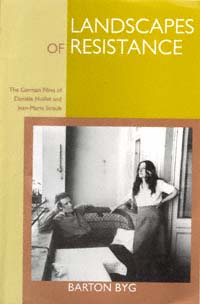 | Title: Landscapes of resistance: the German films of Danièle Huillet and Jean-Marie Straub Author: Byg, Barton 1953- Published: University of California Press, 1995 Subjects: Cinema and Performance Arts | Film | German Studies | Intellectual History Publisher's Description: Fervently admired and frequently reviled, Jean-Marie Straub and Danièle Huillet - who have lived and worked together for almost forty years - may well be the most uncompromising, not to say intransigent, filmmakers in the history of the medium. Their radical and deeply political films placed them as forerunners of the New German Cinema movement in the 1960s and influential figures in the subsequent explosion of the European avant-garde. In Landscapes of Resistance , Barton Byg fills a significant gap in modern German and European cinema studies by tracing the career of the two filmmakers and exploring their connection to German modernism, in particular their relationship to the Frankfurt School.Although they are not German themselves, Straub and Huillet have used German material as the basis for the majority of their films. They have transcribed prose by Böll and Kafka, operas by Schoenberg, and verse dramas by Holderlin. Byg explores how their work engages German culture with a critical distance and affection and confronts the artificiality of divisions between high and low culture. [brief] Similar Items |
| 15. | 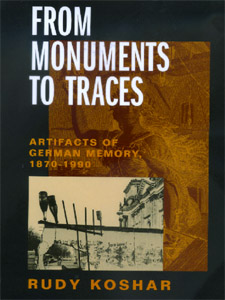 | Title: From monuments to traces: artifacts of German memory, 1870-1990 Author: Koshar, Rudy Published: University of California Press, 2000 Subjects: German Studies | History | Architectural History | European History Publisher's Description: Rudy Koshar constructs a powerful framework in which to examine the subject of German collective memory, which for more than a half century has been shaped by the experience of Nazism, World War II, and the Holocaust. Finding the assumptions of many writers and scholars shortsighted, Koshar surveys the evidence of postwar German memory in the context of previous traditions. From Monuments to Traces follows the evolution of German "memory landscapes" all the way from national unification in 1870-71 through the world wars and political division to reunification in 1990. The memory landscapes of any society may incorporate monuments, historical buildings, memorials and cemeteries, battlefields, streets, or natural environments that foster shared memories of important events or personalities. They may also be designed to divert public attention from embarrassing or traumatic histories. Koshar argues that in Germany, memory landscapes have taken shape according to four separate paradigms--the national monument, the ruin, the reconstruction, and the trace--which he analyzes in relation to the changing political agendas that have guided them over time. Despite the massive ruptures of Germany's history, we see that significant continuities have served to counterbalance the traumas of the German past. [brief] Similar Items |
| 16. | 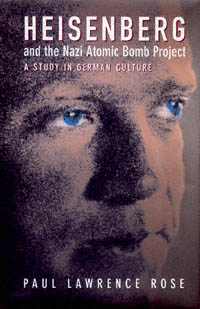 | Title: Heisenberg and the Nazi atomic bomb project: a study in German culture Author: Rose, Paul Lawrence Published: University of California Press, 1998 Subjects: History | European History | German Studies | European Studies | Science | Technology and Society | Physics | History and Philosophy of Science Publisher's Description: No one better represents the plight and the conduct of German intellectuals under Hitler than Werner Heisenberg, whose task it was to build an atomic bomb for Nazi Germany. The controversy surrounding Heisenberg still rages, because of the nature of his work and the regime for which it was undertaken. What precisely did Heisenberg know about the physics of the atomic bomb? How deep was his loyalty to the German government during the Third Reich? Assuming that he had been able to build a bomb, would he have been willing? These questions, the moral and the scientific, are answered by Paul Lawrence Rose with greater accuracy and breadth of documentation than any other historian has yet achieved.Digging deep into the archival record among formerly secret technical reports, Rose establishes that Heisenberg never overcame certain misconceptions about nuclear fission, and as a result the German leaders never pushed for atomic weapons. In fact, Heisenberg never had to face the moral problem of whether he should design a bomb for the Nazi regime. Only when he and his colleagues were interned in England and heard about Hiroshima did Heisenberg realize that his calculations were wrong. He began at once to construct an image of himself as a "pure" scientist who could have built a bomb but chose to work on reactor design instead. This was fiction, as Rose demonstrates: in reality, Heisenberg blindly supported and justified the cause of German victory. The question of why he did, and why he misrepresented himself afterwards, is answered through Rose's subtle analysis of German mentality and the scientists' problems of delusion and self-delusion. This fascinating study is a profound effort to understand one of the twentieth century's great enigmas. [brief] Similar Items |
| 17. | 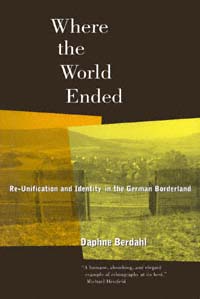 | Title: Where the world ended: re-unification and identity in the German borderland Author: Berdahl, Daphne 1964- Published: University of California Press, 1999 Subjects: Anthropology | Cultural Anthropology | German Studies | Geography | European Studies | Social Problems Publisher's Description: When the Berlin Wall fell, people who lived along the dismantled border found their lives drastically and rapidly transformed. Daphne Berdahl, through ongoing ethnographic research in a former East German border village, explores the issues of borders and borderland identities that have accompanied the many transitions since 1990. What happens to identity and personhood, she asks, when a political and economic system collapses overnight? How do people negotiate and manipulate a liminal condition created by the disappearance of a significant frame of reference?Berdahl concentrates especially on how these changes have affected certain "border zones" of daily life - including social organization, gender, religion, and nationality - in a place where literal, indeed concrete, borders were until recently a very powerful presence. Borders, she argues, are places of ambiguity as well as of intense lucidity; these qualities may in fact be mutually constitutive. She shows how, in a moment of headlong historical transformation, larger political, economic, and social processes are manifested locally and specifically. In the process of a transition between two German states, people have invented, and to some extent ritualized, cultural practices that both reflect and constitute profound identity transformations in a period of intense social discord. Where the World Ended combines a vivid ethnographic account of everyday life under socialist rule and after German reunification with an original investigation of the paradoxical human condition of a borderland. [brief] Similar Items |
| 18. | 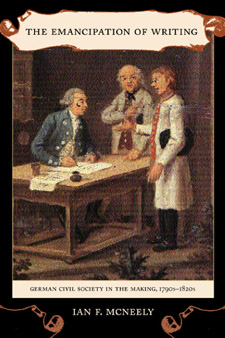 | Title: The emancipation of writing: German civil society in the making, 1790s-1820s Author: McNeely, Ian F 1971- Published: University of California Press, 2003 Subjects: History | European Studies | German Studies | European History | Sociology | Political Theory | Anthropology Publisher's Description: The Emancipation of Writing is the first study of writing in its connection to bureaucracy, citizenship, and the state in Germany. Stitching together micro- and macro-level analysis, it reconstructs the vibrant, textually saturated civic culture of the German southwest in the aftermath of the French Revolution and Napoleon's invasions. Ian F. McNeely reveals that Germany's notoriously oppressive bureaucracy, when viewed through the writing practices that were its lifeblood, could also function as a site of citizenship. Citizens, acting under the mediation of powerful local scribes, practiced their freedoms in written engagements with the state. Their communications laid the basis for civil society, showing how social networks commonly associated with the free market, the free press, and the voluntary association could also take root in powerful state institutions. [brief] Similar Items |
| 19. | 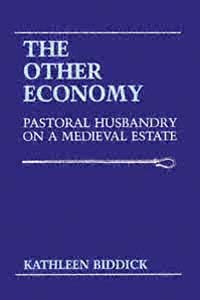 | Title: The other economy: pastoral husbandry on a medieval estate Author: Biddick, Kathleen Published: University of California Press, 1989 Subjects: History | European History | Medieval Studies Publisher's Description: While the cereal agriculture of medieval Europe has been studied exhaustively, the pastoral resources and livestock husbandry of medieval estates have been seriously neglected. Kathleen Biddick's examination of one estate, Peterborough Abbey, during several decades before and after 1100 and the first decade after 1300, brings a new balance to the subject of the medieval economy. Her pioneering methodology and the conclusions she reaches will interest archaeologists and agricultural historians as well as anthropologists, economists, and historians of early European development.Drawing on the archival records of the abbey, an estate that straddled the "classic" open-field agriculture of the English Midlands and the more pastorally-oriented farming of the English peat fens, Biddick describes in great detail how these farmers managed their herds and consumed and marketed livestock products such as meat, wool, hides, milk, and cheese. Commitment to conserving consumption strategies did not mean that the Abbey resisted market involvement and technological innovation. Large numbers of work and cart horses indicate the estate's economic interest in speedy haulage. Cereal yields, where they are calculable, compare favorably to the high-yielding demesnes of parts of Norfolk, the most agriculturally advanced region of medieval England. By showing how the Abbey coordinated its resources to enhance diversity and flexibility, The Other Economy enlarges our understanding of agrarian lordship and political control over resources in the medieval economy. [brief] Similar Items |
| 20. | 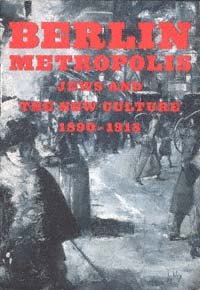 | Title: Berlin metropolis: Jews and the new culture, 1890-1918 Author: Bilski, Emily D 1956- Published: University of California Press, 2000 Subjects: Art | History | Jewish Studies | German Studies Publisher's Description: Between 1890 and 1918 the city of Berlin evolved into a commercial and industrial hub that also became an international center for radical new ideas in the visual, performing, and literary arts. Jews were key leaders in developing this unique cosmopolitan culture. Berlin Metropolis: Jews and the New Culture, 1890-1918 vividly documents the many ways that Jewish artists and entrepreneurs participated in this burst of artistic creativity and promoted the emergence of modernism on the international scene.The book and exhibition at The Jewish Museum highlight leading cultural figures such as Max Liebermann, a founder of the Berlin Secession, and Herwarth Walden, who founded Der Sturm; artists such as Ludwig Meidner and Jakob Steinhardt; pioneers of cabaret, theater, and film, including Max Reinhardt and Ernst Lubitsch; art dealers, publishers, and writers; and leading intellectual and political figures such as Martin Buber and Georg Simmel. These and other fascinating individuals are represented by more than 200 diverse objects: paintings, sculpture, drawings, prints, books, letters, posters, graphic arts, theater memorabilia, and film. The book includes eight essays by scholars of German and Jewish culture and art history that provide a truly interdisciplinary interpretation of the Berlin renaissance.The period represented in Berlin Metropolis was a time when Jews were traditionally restricted from participating in major areas of German public life such as the army, government, and the university. But by turning to the "alternative public spheres" characteristic of urban society - galleries, cafés, journals, theaters, cabarets - they emerged as innovative cultural leaders whose intellectual and artistic impact is still felt today.The exhibition, Berlin Metropolis: Jews and the New Culture, 1890-1918 , will be at The Jewish Museum, New York , from November 14, 1999, to March 5, 2000; and the Norton Museum of Art, West Palm Beach, Florida , from April 1 to June 11, 2000. [brief] Similar Items |